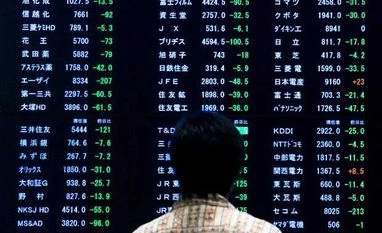An index of Asian shares fell on Wednesday as copper prices tumbled and another bomb scare in Europe hurt risk appetites, while bets that the Federal Reserve remains on track for a rate hike bolstered the dollar.
The greenback edged higher, close to seven-month highs against a basket of currencies as US economic data also backed the case that the US central bank is poised to increase interest rates next month for the first time in nearly a decade.
The dollar's strength undermined dollar-denominated commodities, making them more expensive for holders of other currencies.
Copper continued to suffer, shedding 1.5% to $4,612.50 a tonne after hitting a 6-1/2-year low of $4,590 overnight, amid fears of waning demand from China.
"It's doom and gloom here, the biggest bears are the Chinese, the general view is that little will improve next year," said a fund source in Shanghai, which is hosting the year's biggest copper industry meeting in Asia this week.
MSCI's broadest index of Asia-Pacific shares outside Japan slipped about 0.2%.
More From This Section
Shanghai shares dropped 0.4% early but then changed course and were slightly up after data showing Chinese home prices rose for first time in over a year in October on an annual basis. That signalled a housing market stabilisation that could help re-energise the listless economy.
On Tuesday, Wall Street shares ceded earlier gains to end almost flat after news that German authorities called off a soccer game which German Chancellor Angel Merkel was due to attend, citing threats of bombing, sparking fears of another attack coming only days after the deadly assault in Paris.
"Coming less than a week after the incident in Paris, it would be a natural reaction, even though consensus seems to be growing earlier that the impact of the terror attack would be limited," said Hirokazu Kabeya, chief global strategist at Daiwa Securities.
"Markets are likely to be going back and forth for now," he added.
Media reports that separate Air France flights to Paris from the United States were diverted as a security precaution also weighed on sentiment.
Japan's Nikkei bucked the downtrend, adding about 0.8% as the yen shrugged off its traditional status as a safe-haven currency and edged down against a backdrop of divergent monetary policy expectations.
In contrast with the Fed's expected course of action, the Bank of Japan is expected to hold steady at its two-day policy meeting that began on Wednesday.
"We're seeing very encouraging signs today, especially the dollar's strength against the yen and the aggressive gains we're seeing in some cyclical stocks, particularly those with US exposure," said Stefan Worrall, cash equities manager at Credit Suisse in Tokyo.
US Treasuries bounced back on safety bids overnight, with the 10-year yield slipping from day's high of 2.313%. It stood at 2.274% in Asian trade, compared with its US close of 2.261%.
The lower yields failed to damp enthusiasm for the dollar as investors focused on Tuesday's US economic data that affirmed a solid economic picture, supporting the case for the Federal Reserve to raise interest rates in December.
US consumer prices increased in October from the previous month after two straight months of declines, putting annual core inflation at 1.9%.
Industrial output fell short of market expectations but the output in the manufacturing sector posted a solid increase.
The dollar index was up 0.1% at 99.693, after hitting a high of 99.745 on Tuesday, within sight of its 12-year peak of 100.39 set in March.
Against the yen, the dollar was nearly flat at 123.43 yen, within sight of a 2-1/2-month high of 123.60 yen hit on November 9.
The euro also slipped about 0.1% to $1.0633, just above Tuesday's seven-month low of $1.0630, as the common currency continues to be undermined by expectations that the European Central Bank will take fresh monetary easing steps next month.
Gold hit a 5-1/2-year low of $1,065.30 per ounce, extending its fall this year to 10%. It last stood at $1,066.90, down about 0.3%, as the strong dollar offset its traditional safe-haven appeal.
Oil prices rebounded a tad after data showed an unexpected stockpile draw for last week, though they remained not far from 6-1/2-year lows hit in August on persistent concerns about a global supply glut.
US crude futures were up about 0.8% at $40.99 per barrel, moving off Tuesday's low of $40.58, while Brent last stood at $43.95, up about 0.9% but less than $2 away from its August low of $42.23.
)